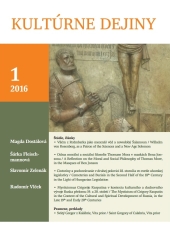Odraz morální a sociální filosofie Thomase Mora v maskách Bena Jonsona
Reflection on the Moral and Social Philosophy of Thomas More, in the Masques of Ben Jonson
Author(s): Šárka FleischmannováSubject(s): History
Published by: VERBUM - vydavateľstvo Katolíckej univerzity v Ružomberku
Keywords: Ben Jonson; Thomas More; masque; renaissance philosophy; Elizabethan poetics
Summary/Abstract: The English playwright, Ben Jonson, is the author of many plays, from which The Alchemist and Volpone stands out above all; he is also the author of the theoretically oriented publication Discoveries Made Upon Men and Matter and, during the reign of James I, he became court composer of the so-called masques. Masques were a subgenre of drama, which was characterised by spectacular costumes (the scenic and costume designs were, in comparison with classical theatre, spectacular in masques, especially at the time when Jonson collaborated with Inigo Jones), also typical for them was that the courtiers themselves performed in masques and, compared to other things, that their fame was quite short lived. The transience of masques stemmed primarily from the fact that they were usually played once, it seldom happened that the masque would be presented more times. Jonson, however, was not satisfied with the fact that he put considerable effort into the work, the fame of which went away after its performance. He started to record masques, as well as to annotate them, so that the reader could at least partially have the pleasure of his work. Jonson, in this way, established a new original literary genre.The content of masques usually used to be the glorification of the monarch and his actions. The task of the masque was to further celebrate a particular event such as a wedding or some important holiday. The genre of the masque could thus be considered to be only a means to entertain the courtiers and raising the majesty of the sovereign, but on closer inspection their importance to English culture may be uncovered. The aim of the study is to show how the masque contributed to the development of the English literary culture, in this way it is emphasised that masques did not stand on the edge of the Renaissance complex of knowledge, but rather that they were fully part of it. The fact that masques were an adequate part of the Elizabethan complex of science is, among other things, proven by the fact that a link with moral and social philosophy may be found among them. The intention of the study is thus an analysis of selected masques by Jonson, precisely in the context of English moral and social philosophy.
Journal: Kultúrne dejiny
- Issue Year: 7/2016
- Issue No: 1
- Page Range: 20-34
- Page Count: 15
- Language: Czech

